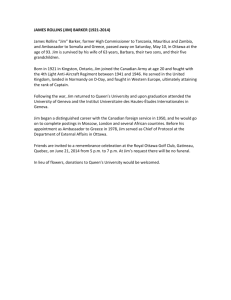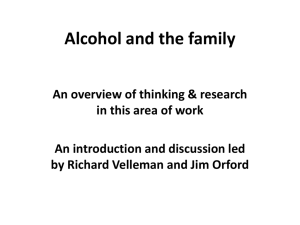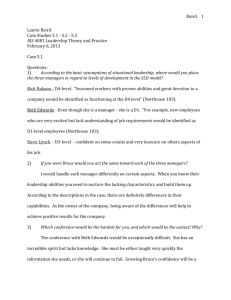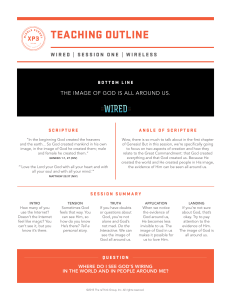2: Does Evolution Disprove God?
advertisement
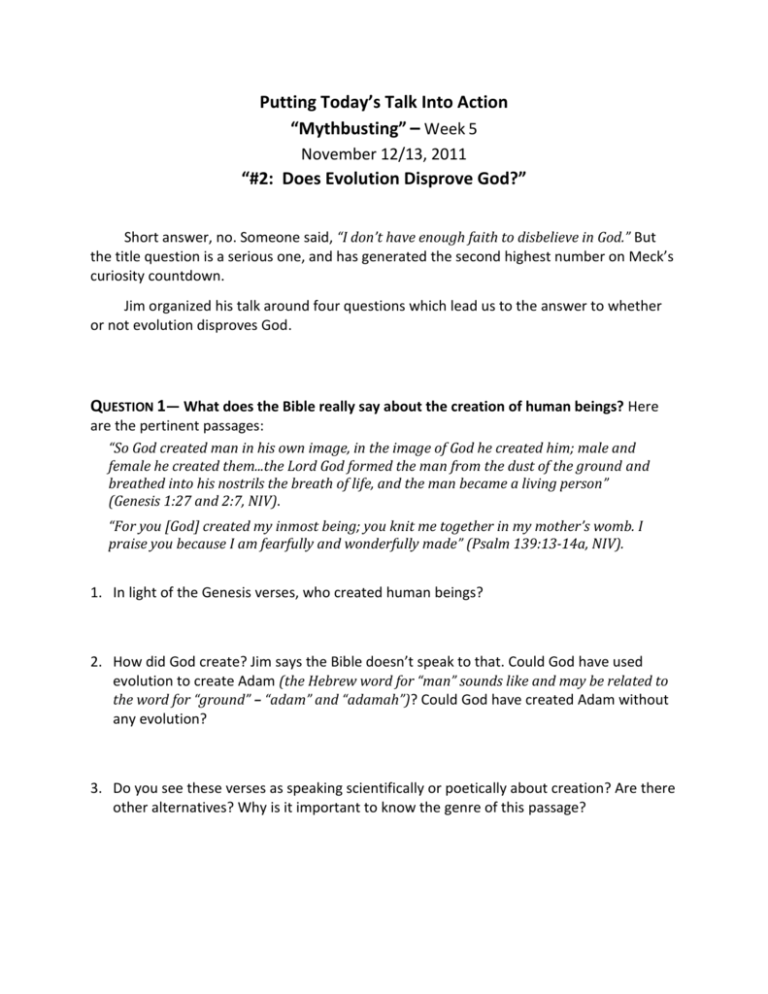
Putting Today’s Talk Into Action “Mythbusting” – Week 5 November 12/13, 2011 “#2: Does Evolution Disprove God?” Short answer, no. Someone said, “I don’t have enough faith to disbelieve in God.” But the title question is a serious one, and has generated the second highest number on Meck’s curiosity countdown. Jim organized his talk around four questions which lead us to the answer to whether or not evolution disproves God. QUESTION 1— What does the Bible really say about the creation of human beings? Here are the pertinent passages: “So God created man in his own image, in the image of God he created him; male and female he created them...the Lord God formed the man from the dust of the ground and breathed into his nostrils the breath of life, and the man became a living person” (Genesis 1:27 and 2:7, NIV). “For you [God] created my inmost being; you knit me together in my mother’s womb. I praise you because I am fearfully and wonderfully made” (Psalm 139:13-14a, NIV). 1. In light of the Genesis verses, who created human beings? 2. How did God create? Jim says the Bible doesn’t speak to that. Could God have used evolution to create Adam (the Hebrew word for “man” sounds like and may be related to the word for “ground” – “adam” and “adamah”)? Could God have created Adam without any evolution? 3. Do you see these verses as speaking scientifically or poetically about creation? Are there other alternatives? Why is it important to know the genre of this passage? QUESTION 2— What is the relationship between science and religion? 4. Why does this question matter to the question under discussion? Do you see truth as having categories or is truth a single whole? Do science and religion inevitably fight each other as enemies? 5. Jim says the empirical method of science can’t really study or get at the question of God sufficiently to prove or disprove God’s existence. Do you agree? Why or why not? 6. Do you think the philosophy of modern science is biased toward or against the existence of God? Why do you think so? QUESTION 3— What is the heart of the tension between evolution and belief in God? 7. When Jim refers to reductive naturalism as the philosophical mindset of modern science, what does he mean? How would you explain it to someone else? Do you see attitude and philosophy of scientists easily ruling out God? 8. Jim offers several reasons why science does not force disbelief in God. These are realities that point toward God’s existence and his creating. Look these over, discuss whatever you please about them. Do you think becoming conversant with these arguments for God will help as you bear witness for Christ to non-Christians? All designs imply a designer. The more complex an object or an organism, the more evidence there is of a creator. When you study the universe and human beings, chance doesn’t account for it all. God does. Irreducible complexity argues for a creator. Science used to think that simplicity was at the root of complex organisms. Now we know that even individual cells have complex machinery that could not have evolved, but are made intact. The anthropic principle says that the existence of humans on planet earth is no accident. Conditions on and around our planet are just right to support human life, and even a small variance would not support life. “The heavens are telling the glory of God; they are a marvelous display of his craftsmanship. Day and night they keep on telling about God. Without a sound or word, silent in the skies, their message reaches out to all the world” (Psalm 19:1-4, LB). Men and women have a hunger for God and a drive toward him. The desire itself means God is real. “[God has] set eternity in the hearts of men” (Ecclesiastes 3:11, NIV). All societies since time immemorial have shown a good consensus on basic morality, what’s right and what’s wrong. Why? It is built into humans by God. “Created in the image of God” is how Genesis says it. QUESTION 4— Does evolution disprove God? 9. Since even the simplest of cells are made of complex parts, and since evolution is not a straightforward line from simple to sophisticated, Jim contends that evolution requires a guiding force from outside to work. Does this make sense to you? Did God use evolution to create people? What did Jim say? You? The Bible? 10. The idea that it has to be evolution versus God sets up a false division. According to Jim, remember, the actual division is between folk who believe in theistic evolution and those who hold to atheistic evolution. Would you frame the issue the same way? 11. Christianity teaches that we can know a lot about God by studying nature. “For since the creation of the world God’s invisible qualities—his eternal power and divine nature—have been clearly seen, being understood from what has been made, so that men are without excuse” (Romans 1:20, NIV). We believe that the truest and profoundest science is no threat to the reality of God. Is that a fair statement? 12. And even more specifically, look at Jesus and consider how this passage invites people to trust him: “[Jesus] is the image of the invisible God, the firstborn over all creation. For by him all things were created: things in heaven and on earth, visible and invisible, whether thrones or powers or rulers or authorities; all things were created by him and for him. He is before all things, and in him all things hold together” (Colossians 1:15-17, NIV).
